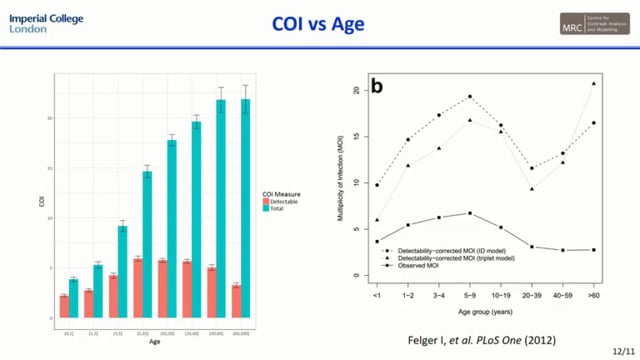Last Updated: 27/05/2025
Impact of infection complexity on P. falciparum sexual commitment and gametocytemia
Objectives
To examine the impact of host, parasite, and environmental factors on P. falciparum sexual commitment and gametocytemia in infections occurring in a longitudinal cohort study conducted in Malawi, based on expression of the ap2-g gene and a gametocyte-specific genotyping marker.
Since the 2007 call for malaria eradication, research and programmatic efforts have shifted from controlling malaria through identification and treatment of clinical disease to elimination of infection and interruption of malaria transmission. Efforts to reduce malaria transmission include interventions to kill the mosquito vector and/or reduce vector biting or to reduce human to mosquito transmission of gametocytes, the sexual stage of the malaria parasite, through treatment or transmission-blocking vaccines. Recent studies have delineated the molecular mechanisms underlying parasite sexual commitment and gametocyte development. In particular, the identification of AP2-G as a master regulator of gametocytogenesis has allowed quantification of parasite sexual commitment based on estimates of ap2-g expression. Approximately, 1 – 30% of parasites in an infection express ap2-g, suggesting that not all asexual parasites in an infection commit to produce gametocytes. However, the factors that contribute to parasite investment in sexual reproduction are not fully understood. Several studies have identified associations between host, parasite, and environmental factors and gametocytemia. A potentially important factor that requires more in-depth evaluation is the impact of polyclonality on parasite sexual investment. Evolutionary theory suggests that competition of co-infecting parasite clones in a polyclonal infection can influence the balance in investment in asexual replication versus sexual differentiation; however, limited research has been performed to understand how within-host clone interactions impact gametocyte production in P. falciparum infections. Because a large proportion of infections in high transmission areas are polyclonal, understanding how infection complexity impacts sexual commitment and gametocytemia is important for predicting the impact of new interventions on malaria transmission. Likewise, as transmission (and infection complexity) decrease in response to interventions, understanding the relationship between infection complexity and transmission may allow identification of transmission reservoirs in the face of changing malaria epidemiology. A newly developed gametocyte genotyping marker will be used to examine how infection complexity and clone composition are associated with relative frequency and/or presence of gametocytes of a given clone within an infection. By investigating these factors in parasites from individuals followed longitudinally, the target is to gain insights into parasite biology and the impact of infection complexity on parasite sexual investment, and to discover actionable associations that allow identification of target populations for transmission-reducing interventions.
Apr 2023 — Mar 2025
$231,750


